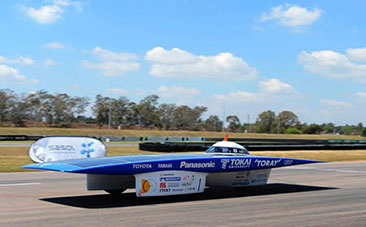
South African Science Scholars Shine in the Sasol Solar Challenge
Renewable energy spells big things for South Africa’ economic future, if sustainable and affordable solutions are found. Working towards making solar power a feasible source of motoring energy, the Sasol Solar Challenge invites renewable energy addicts from across the globe to compete in an eight-day country-wide endurance challenge. Held every two years under the auspices […]

Renewable energy spells big things for South Africa’ economic future, if sustainable and affordable solutions are found. Working towards making solar power a feasible source of motoring energy, the Sasol Solar Challenge invites renewable energy addicts from across the globe to compete in an eight-day country-wide endurance challenge.

Held every two years under the auspices of Motorsport South Africa and the Fédération Internationale de l’Automobile, the event is a collaboration between university students, lecturers, scholars, private individuals and industry and government partners.
This year’s Solar Challenge kicked off on Saturday 27 September at the Council for Scientific and Industrial Research (CSIR) in Pretoria, with the Tshwane University of Technology representing Pretoria.
The Solar Challenge will finish on 4 October in Cape Town and has 14 local and international teams participating, including six local universities and two schools.
The teams are responsible for creating solar-powered vehicles capable of crossing some of the most gruelling terrain in South Africa. The winners will be determined through various categories that include average time and distance, average energy consumption and the teams’ vehicle’s average battery use.
“We have taken a different approach to the route for the 2014 challenge. Participants will have the option to determine their daily distance travelled by completing driving loops varying from 58km to 132km to put their vehicles through the ultimate endurance test,” said Sasol Solar Challenge director, Winstone Jordaan.
“Consideration will be given to vehicles demonstrating advanced automotive technologies and environmentally conscious designs to prove their capabilities,” he continued.
He added that the competition aimed to promote the sciences among South African scholars.
“The primary objective of this challenge is to promote the STEM subjects, which is science, technology, engineering and maths. Also, to get school kids involved in these fields and to give universities the opportunity to demonstrate innovation, build vehicles using sophisticated technology and to put it into practice,” he said.
Encouraging students to take up science
There will be a schools engagement programme at pit stops along the route to encourage South African scholars to consider studying science, technology, engineering and maths. The formal programme involves 200 schools on the route and includes a kit that explains how solar-powered vehicles work and material for pupils to build their own model solar-powered car.
Naledi Pandor, minister of science and technology, was also at the event. She said, “The Sasol Solar Challenge provides practical challenges that enable students to broaden their experience by getting involved in real-world projects, international networking, practical learning, logistics and understanding the need for and the value of engineers.
“The power of innovative platforms like this event validates research into electric vehicles and renewable energy.”
Tendani Tsedu, CSIR media relations manager, said: “For the CSIR to be involved is very important because we do research in renewable energy – an objective of this event. We’re proud to promote the use of natural resources as opposed to fossil fuels which is harmful to the environment.”
The solar challenge ends in Cape Town after travelling through Kroonstad, Bloemfontein, Colesberg, Graaff-Reinet, Port Elizabeth, Knysna and Swellendam. The main route will span approximately 2000km through the country, covering an average distance of 260km a day. Teams will have the option to expand their daily distance, by driving loops varying from 58km up to 132km. Loops can be driven more than once and have to be completed entirely in order to count. Towns that are included in these loops are Sasolburg, Deneysville, Winburg, Theunissen, Edenburg, Reddersburg, Hanover, Jansenville, Klipplaat, Stormsrivier, Heidelberg WC, Witsand and Caledon. It is expected that the top teams will reach a total of 6000km, covering at least 700km a day on average.
To learn more about the Solar Challenge, visit the Facebook page or follow the Twitter account, or follow the teams on the leader board.
Source: www.southafrica.info
